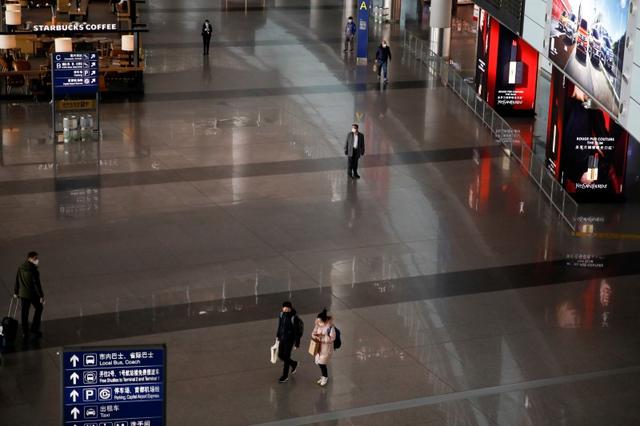Chinese scientists and health experts involved in the country’s fight against the coronavirus believe the worst is now over, downplaying warnings that the disease could become seasonal or that a deadlier “second wave” could hit later in the year.

As the pandemic continues to spread overseas, a growing number of countries are bracing themselves for a worst-case scenario in which COVID-19 remains in circulation until next year at the earliest.
But medical advisers in China have expressed confidence that the country’s strict containment measures have done enough to ensure that the outbreak can be brought under complete control, domestically at least, within weeks.
Though they remain wary of the risks of “importing” cases from overseas, they say China should be capable of eliminating COVID-19 in the same way it eliminated Severe Acute Respiratory Syndrome (SARS) in 2003. SARS was eventually contained after the government imposed stringent screening and quarantine measures.
“For me, a second outbreak (of coronavirus), a domestic outbreak in China, wouldn’t be a great concern,” said Cao Wei, deputy director of the Department of Infectious Diseases at the Peking Union Medical College Hospital.
She told a briefing on Monday that while China needed another month to make a final judgment, the existing prevention and control measures should be enough to bring the epidemic to an end domestically.
The World Health Organization has said the coronavirus reached a peak in China around late February. Zhong Nanshan, a senior government adviser who helped detect and defeat SARS in 2003, said it “could be over by June” if other countries take the required action.
On Wednesday, there were no new domestic cases in the disease’s epicenter of Wuhan for the first time since the outbreak began. However, “imported” infections reached a record 34, and have outnumbered domestic transmissions for five consecutive days.
Ian Henderson, director of the Institute for Molecular Bioscience at the University of Queensland, said China’s actions to contain the virus have been “extraordinary” but there could be a second outbreak, this time imported.
“(What) remains possible is that as controls around isolation are relaxed in China, with a population that is still susceptible, then the virus may resurge if it has not been eradicated elsewhere,” he said.
Gao Zhengliang, vice-director of the China Cell Biology Institute told the official Youth Daily newspaper that the country had now completed “99 out of 100 steps” required to defeat the coronavirus, though he warned that if global infections spiraled out of control, “the costs and sacrifices China has made will be downgraded.”
Some experts have referred to the infection patterns of the devastating 1918-19 influenza epidemic that killed more than 50 million people during three different waves, with the second the deadliest. However, Henderson said it was important to recognize the current virus was different from influenza.FILE PHOTO: March 17, 2020 picture of staff in protective suits accompanying a passenger outside a centralized facility for screening and registration near the Beijing Capital International Airport in Beijing as the country tries to contain imported cases of the coronavirus. REUTERS/Thomas Peter/File Photo
Global inter-connectedness means that instead of coming in waves, new viruses are now more likely to spread and circulate until they mutate or until a certain level of immunity is reached. One crucial issue is how long a previously infected patient remains immune.
“The number one point to get across is that in terms of the behavior of this virus we are still very much in the dark,” Henderson said. “The issue around protective immunity is difficult to answer because we simply do not have sufficient information.”
Some experts have raised the possibility that COVID-19 could become an entrenched seasonal illness along with ordinary influenza.
Preliminary studies have shown a possible correlation between the epidemic and climate patterns. A paper produced by researchers in Europe this week said the coronavirus preferred cool and dry conditions which could lead to seasonal global outbreaks “much like other respiratory diseases”.
However, there have still been cases in warmer and more humid climates in southeast Asian countries, including Thailand and Singapore.
U.S. President Donald Trump has been one of many to suggest that COVID-19 could go away of its own accord as temperatures rise in the northern hemisphere.
However, Marc Lipsitch, a communicable disease expert at the Harvard T.H. Chan School of Public Health, said while warmer and wetter weather could reduce the contagiousness of the coronavirus, “it is not reasonable to expect those declines alone to slow transmission enough to make a big dent.”
Gao of the China Cell Biology Institute said given the higher fatality rate for the coronavirus, relaxing curbs was not an option.
“The resolute curbs on the coronavirus must be continued, it absolutely cannot be allowed to co-exist with humans in the same way as the influenza virus.”
Reuters
Now Playing: Love Bug
Aretti Adi
SPONSORED LINKS
LOAN FOR TRAVEL, VISA, JAPA, PoF UP TO N200M (CLICK HERE)
[CLICK HERE] For Music Artwork, Website Design And SEO Setup
INSTALL 9JAFLAVER MUSIC APP, STREAM, DOWNLOAD, AND PLAY MUSIC OFFLINE
CHECK OUT FUNNY PICTURE AND MEME HERE (CLICK HERE)
Chissom Anthony – Glory To God In The Highest [See Trending Gospel Song]
Copyright © 2014-2026 9jaflaver. All Rights Reserved.
About us | DMCA | Privacy Policy | Contact us
| Advertise| Request For Music | Terms Of Service
9jaflaver is not responsible for the content of external sites.